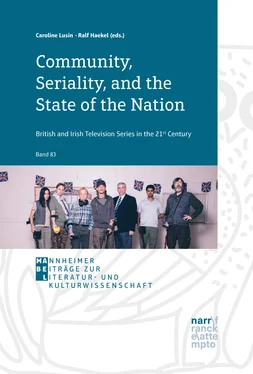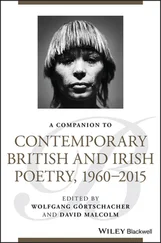Caroline Lusin / Ralf Haekel
Community, Seriality, and the State of the Nation: British and Irish Television Series in the 21 stCentury
Narr Francke Attempto Verlag Tübingen
[bad img format]
© 2019 • Narr Francke Attempto Verlag GmbH + Co. KG
Dischingerweg 5 • D-72070 Tübingen
www.narr.de• info@narr.de
Das Werk einschließlich aller seiner Teile ist urheberrechtlich geschützt. Jede Verwertung außerhalb der engen Grenzen des Urheberrechtsgesetzes ist ohne Zustimmung des Verlages unzulässig und strafbar. Das gilt insbesondere für Vervielfältigungen, Übersetzungen, Mikroverfilmungen und die Einspeicherung und Verarbeitung in elektronischen Systemen.
ePub-ISBN 978-3-8233-0135-6
Publishing in general and collections of essays in particular depend on the collaboration of a whole range of people. At this stage, we would therefore like to thank everyone involved in this project most heartily. We would like to thank our contributors for sharing their fascinating insights into the rich material of contemporary British and Irish television series. Thank you for your time and patience – it was a pleasure to work with you! Besides, we are very grateful to Gunter Narr Verlag and its publishing team for providing a platform for this book series. Annika Gonnermann has done us a great service through her untiring efforts to acquire rights of image use. A huge thank you goes to Harriet Mahier, who proofread the entire volume with great care as a native speaker and made valuable suggestions that went far beyond the scope of this task. And finally, we are deeply indebted to the team of the Chair of English Literature and Culture at the University of Mannheim, especially – in alphabetical order – to Hanna Hellmuth, Sina Schuhmaier, and Lisa Schwander, who were a tremendous help in all stages of the editing process: you’re simply the best!
Caroline Lusin and Ralf Haekel
‘This is England’: Community, the State of the Nation, and Seriality in Contemporary British and Irish Television Series
Caroline Lusin and Ralf Haekel
Yeah, this is England, and this is England, and this is England. And for what? For what now? Ey, what for?
( This Is England , 2006)
The title of Shane Meadows’ award-winning film This Is England (2006) leaves no doubt about its subject: the “era-defining drama” (Harvey) portrays working-class life in the Midlands in a way that strives to convey a realistic idea of England in the 1980s. The film, along with its spin-offs This Is England ’86 (2010), This Is England ’88 (2011), and This Is England ’90 (2015), exemplifies key tendencies in recent British and Irish television series. Set in 1983, This Is England flaunts a montage of iconic news snippets in the opening credits that firmly situate its plot in the political, social, and cultural climate of the time. Apart from repeated shots of then Prime Minister Margaret Thatcher, the credits include footage of Sting in concert, the wedding of Prince Charles and Lady Di, BMX bikes, Rubik’s cube, political protest, violent riots, fascist parades, and gruesome scenes of the Falklands War. This socio-historical context is closely entwined with individual lives from the start, as the political climate obviously determines the youth of twelve-year-old protagonist Shaun (Thomas Turgoose): the opening shot shows a photo of his uniformed father, a victim of the Falklands War, and his radio alarm wakes him to a speech which Margaret Thatcher gave to Wembley Youth Rally (Thatcher). Held shortly before the 1983 general election, this speech encapsulates key points of Thatcher’s policies, whose repercussions still make themselves felt in the 21 stcentury. In describing Thatcherism as “a kind of trauma or ghostly presence that the nation has yet to work through” (Su 1095), John J. Su highlights how “contemporary British literature”, and, one might add, television, “is defined in terms of responses to a set of political, economic, and cultural forces associated with Margaret Thatcher” (1083). This Is England and the ensuing drama series thus investigate the origins of many of the issues contemporary British and Irish society are struggling with today.
In centring on a group of young skinheads, This Is England addresses questions of identity, belonging, and community that figure prominently in the majority of contemporary television programmes. As a sociological concept, community goes back to Ferdinand Tönnies’ distinction between ‘ Gemeinschaft’ and ‘ Gesellschaft’ – ‘community’ and ‘society’. In Tönnies’ influential study, which was first published in 1887, community appears as organic and associated with ‘real’ life, whereas society represents an artificial, mechanical construct (see 3).1 For Tönnies, the term ‘community’ contrasts with society in designating a group of people whose togetherness is based on interaction and mutual esteem. This is perfectly in line with the representation of the skinheads in This Is England , who set themselves apart from the remainder of society as a group whose particular “style helped reinforce a shared, systematic subcultural identity” (Bergin). At the beginning of the film, the skinheads embody the generally positive view of community highlighted by Zygmunt Bauman:
Community, we feel, is always a good thing. […] To start with, community is a ‘warm’ place, a cosy and comfortable place. It is like a roof under which we shelter in heavy rain, like a fireplace at which we warm our hands on a frosty day. Out there, in the street, all sorts of dangers lie in ambush […]. In here, in the community, we can relax – we are safe […]. In a community, we all understand each other well, we may trust what we hear, we are safe most of the time and hardly ever puzzled or taken aback. We are never strangers to each other. We may quarrel – but these are friendly quarrels […]. (1-2)
If community in this sense provides a feeling of warmth, security, and belonging, This Is England foregrounds this notion when Shaun first meets the group of skinheads, led by genial Woody (Joseph Gilgun). The inclusivity and West Indian roots of skinhead culture come to the fore in the fact that a Black British youth nicknamed ‘Milky’ (Andrew Shim) is also part of this group. After a violent struggle which Shaun, clearly an outsider, has to face at school, Woodie invites the boy to join the ‘warm circle’ of the skinheads. However, critics like Zygmunt Bauman and Gerard Delanty emphasise that this positive sense of community has fundamentally been connected with a sense of loss since the arrival of modernity, “a sense of passing of an allegedly organic world” (Delanty 15). The concept of community basically serves the purpose of projecting a holistic notion of togetherness not touched by the characteristics of the modern age: contingency, differentiation, and specialisation. This may also be one of the reasons why, within the past twenty years, there has been an “upsurge of TV dramas that deal with periods in recent British history: the final years of the nineteenth century and the Edwardian era” (Baena 119). Series like Downton Abbey (2010-2015), Parade’s End (2012), and Poldark (2015-) either show communities which, though touched by modernisation, are still largely intact, or they investigate into the historical moments in which the ‘warm place’ of community was perceived to be lost.2
As Zygmunt Bauman pointedly illustrates, the positive view of community as a ‘warm place’ at any rate tends to conceal its origins in an uncompromising division of insiders and outsiders, which “is exhaustive as much as it is disjunctive” (12).
Читать дальше












